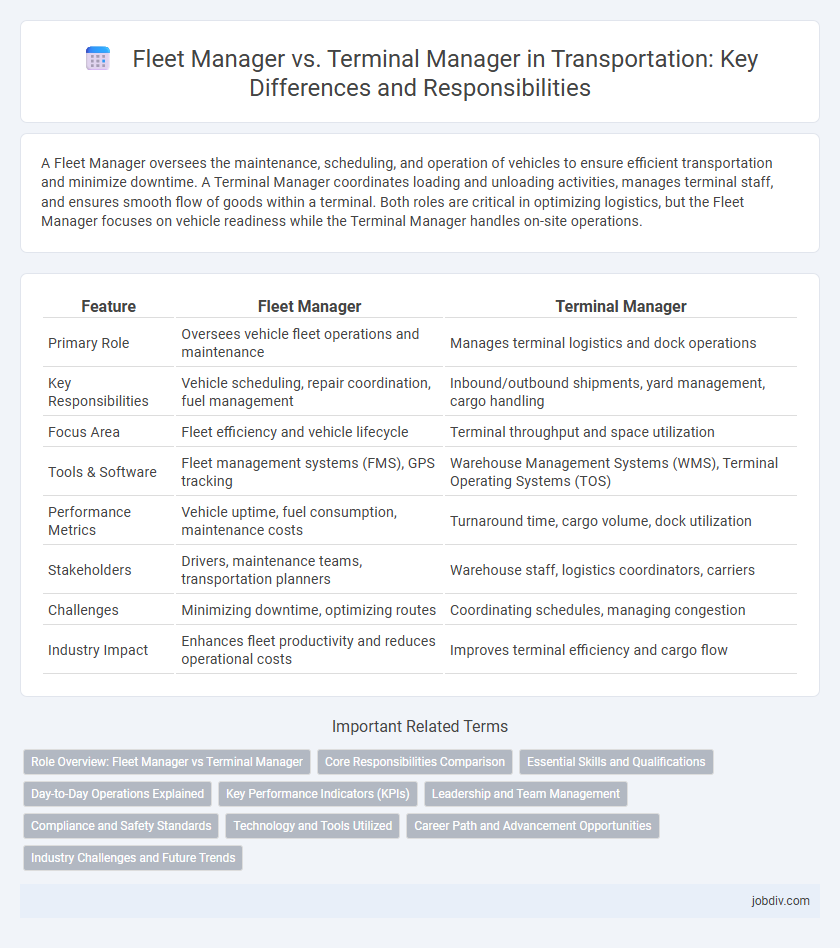A Fleet Manager oversees the maintenance, scheduling, and operation of vehicles to ensure efficient transportation and minimize downtime. A Terminal Manager coordinates loading and unloading activities, manages terminal staff, and ensures smooth flow of goods within a terminal. Both roles are critical in optimizing logistics, but the Fleet Manager focuses on vehicle readiness while the Terminal Manager handles on-site operations.
Table of Comparison
| Feature | Fleet Manager | Terminal Manager |
|---|---|---|
| Primary Role | Oversees vehicle fleet operations and maintenance | Manages terminal logistics and dock operations |
| Key Responsibilities | Vehicle scheduling, repair coordination, fuel management | Inbound/outbound shipments, yard management, cargo handling |
| Focus Area | Fleet efficiency and vehicle lifecycle | Terminal throughput and space utilization |
| Tools & Software | Fleet management systems (FMS), GPS tracking | Warehouse Management Systems (WMS), Terminal Operating Systems (TOS) |
| Performance Metrics | Vehicle uptime, fuel consumption, maintenance costs | Turnaround time, cargo volume, dock utilization |
| Stakeholders | Drivers, maintenance teams, transportation planners | Warehouse staff, logistics coordinators, carriers |
| Challenges | Minimizing downtime, optimizing routes | Coordinating schedules, managing congestion |
| Industry Impact | Enhances fleet productivity and reduces operational costs | Improves terminal efficiency and cargo flow |
Role Overview: Fleet Manager vs Terminal Manager
Fleet Managers oversee vehicle acquisition, maintenance scheduling, and route optimization to ensure efficient transportation operations and cost control. Terminal Managers focus on managing terminal activities such as loading and unloading, inventory control, and coordinating dock workers to maintain smooth cargo flow and operational safety. Both roles are crucial for logistics efficiency but emphasize different operational aspects: fleet assets versus terminal processes.
Core Responsibilities Comparison
Fleet Managers oversee the maintenance, scheduling, and optimization of vehicles to ensure timely and cost-effective transportation services. Terminal Managers coordinate loading, unloading, storage, and safety protocols within transportation hubs to streamline operations and minimize delays. Both roles require strategic planning but differ in scope, with Fleet Managers focusing on vehicle assets and Terminal Managers managing facility-based logistics.
Essential Skills and Qualifications
Fleet managers require expertise in vehicle maintenance, route optimization, and regulatory compliance, supported by skills in logistics management and data analysis. Terminal managers excel in coordinating terminal operations, managing staff schedules, and ensuring safety protocols, requiring strong leadership, communication, and problem-solving abilities. Both roles demand proficiency in transportation software and a comprehensive understanding of supply chain processes.
Day-to-Day Operations Explained
A Fleet Manager oversees vehicle maintenance schedules, driver assignments, and route planning to ensure efficient transportation logistics. A Terminal Manager handles daily operations at shipping or distribution hubs, managing cargo flow, dock scheduling, and staff coordination to optimize terminal efficiency. Both roles require real-time problem-solving but focus on different operational areas: fleet mobility versus terminal handling.
Key Performance Indicators (KPIs)
Fleet Managers primarily monitor vehicle utilization rates, maintenance costs, and fuel efficiency to optimize fleet performance and reduce operational expenses. Terminal Managers focus on KPIs such as cargo throughput, dock turnaround time, and labor productivity to ensure smooth terminal operations and maximize handling capacity. Both roles emphasize real-time data analysis and effective resource allocation to meet organizational efficiency goals in transportation logistics.
Leadership and Team Management
Fleet Managers excel in optimizing vehicle utilization and coordinating driver schedules, demonstrating leadership by ensuring efficient resource allocation and maintenance oversight. Terminal Managers lead ground operations, overseeing cargo handling, staff assignments, and safety compliance to maintain smooth terminal workflows. Both roles require strong team management skills, with Fleet Managers emphasizing driver coordination and Terminal Managers focusing on operational staff leadership to achieve organizational goals.
Compliance and Safety Standards
Fleet Managers oversee vehicle maintenance schedules and driver compliance with federal regulations such as the FMCSA's hours of service rules, ensuring all fleet operations meet safety standards to prevent violations and accidents. Terminal Managers focus on site-specific safety protocols, managing equipment inspections, hazardous material handling, and adherence to OSHA regulations to maintain a secure environment for warehouse and loading dock activities. Both roles collaborate to ensure transportation safety compliance, minimizing operational risks and supporting regulatory audits effectively.
Technology and Tools Utilized
Fleet Managers utilize telematics systems, GPS tracking, and fleet management software to optimize vehicle routing, monitor driver behavior, and ensure maintenance scheduling. Terminal Managers employ warehouse management systems (WMS), automated gate systems, and cargo tracking technologies to streamline loading, unloading, and inventory control processes. Both roles leverage data analytics platforms to enhance operational efficiency and decision-making within transportation logistics.
Career Path and Advancement Opportunities
Fleet Managers typically progress through roles in logistics coordination and vehicle maintenance supervision, advancing by gaining expertise in fleet optimization technologies and regulatory compliance. Terminal Managers often begin in entry-level operations or warehouse supervision roles, developing skills in facility management and staff coordination before moving into terminal leadership positions. Both career paths offer advancement opportunities into senior logistics, supply chain management, or regional operations director roles, with growth driven by project management experience and proficiency in transportation software systems.
Industry Challenges and Future Trends
Fleet Managers face challenges such as optimizing vehicle utilization, ensuring regulatory compliance, and integrating telematics for real-time tracking, while Terminal Managers contend with warehouse congestion, labor shortages, and automation of cargo handling. Both roles must adapt to future trends like electrification of fleets, adoption of AI-driven predictive maintenance, and enhanced data analytics to improve operational efficiency. Embracing sustainability initiatives and smart infrastructure will be critical to overcoming industry pressures and meeting evolving supply chain demands.
Fleet Manager vs Terminal Manager Infographic

 jobdiv.com
jobdiv.com